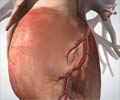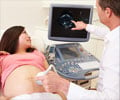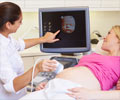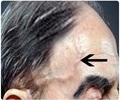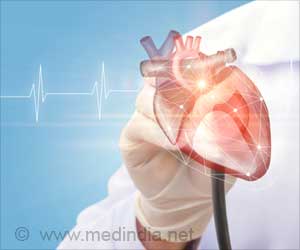Neck ultrasound effective in detecting coronary artery disease, says new study.
Neck ultrasound could be effective in detecting coronary artery disease. The simple, inexpensive and noninvasive carotid artery ultrasound of the neck may be an alternative to the standard, expensive and more invasive coronary angiography. The ultrasound test can also be used to rule out the diagnosis of CAD in patients presenting with reduced heart pump function. The new study by researchers with NYU Langone Medical Center appears in the June 2010 issue of the American Heart Journal.
“Our research has identified that carotid artery ultrasound is capable of identifying the presence of severe and extensive coronary artery disease,” said Harmony R. Reynolds, MD, assistant professor of Medicine and associate director of the Cardiovascular Clinical Research Center at NYU Langone Medical Center. “Based on our findings, physicians might consider using the carotid ultrasound test as an initial screen for CAD in patients with reduced heart pump function and no history of heart attack. If a patient tests positive for plaque buildup in the neck arteries, then it can be followed by angiography of the heart arteries.”When a patient has reduced heart function, severe and extensive CAD is often the cause. CAD is a narrowing of the arteries in the heart caused by deposits of plaque. This condition reduces the flow of blood and oxygen to the heart and may lead to weakening of heart muscle and/or a heart attack.
Traditional diagnosis of CAD is through coronary angiography. However, this test is an invasive and expensive catheter imaging procedure that is associated with risks from contrast material and radiation exposure. In the study, patients underwent the noninvasive carotid artery ultrasound to determine the artery’s intima-media thickness (IMT) and presence or absence of plaque. Researchers concluded that carotid artery ultrasound is a valuable screening tool for diagnosing and excluding CAD when a patient has heart muscle weakness without a known cause.
“Ultrasound of the carotid artery is a very widely available and inexpensive technique, offered at NYU Langone Medical Center and virtually all medical centers and even in many cardiologists’ offices,” said Glenn I. Fishman, MD, director of the Leon H. Charney Division of Cardiology and William Goldring Professor of Medicine at NYU Langone Medical Center. “The study, if replicated in a larger population, could change the screening of patients with unexplained decreased heart pump function, and potentially allow them to avoid the need for invasive coronary angiography.”
Source-Medindia


